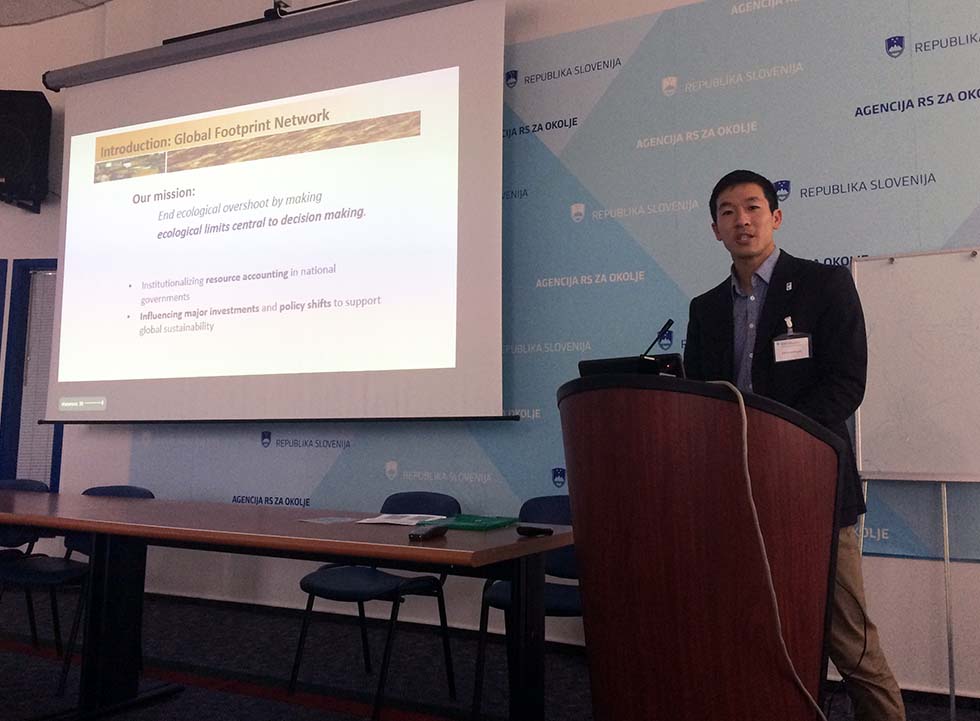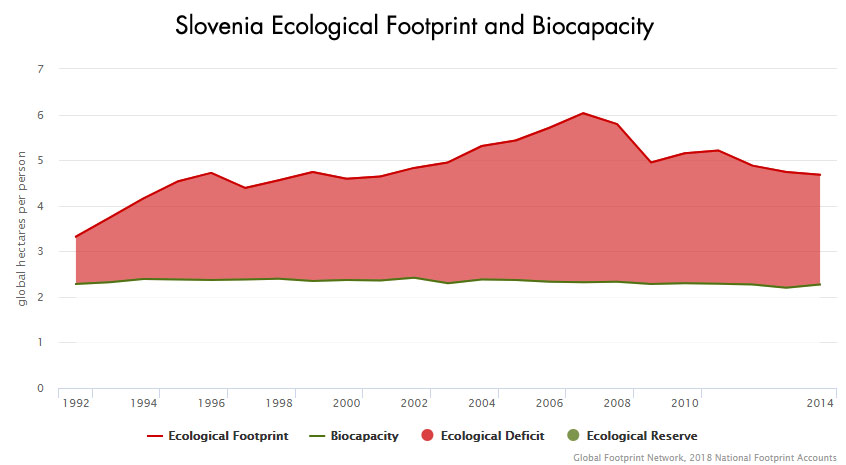LJUBLJANA, SLOVENIA, 25 May 2018—More than two dozen Slovenia government representatives and NGOs completed training this week with Global Footprint Network, an international research organization, as part of a project to incorporate the Ecological Footprint into national environmental and development strategies.
A press conference to outline more details about the project will be held at 10:00 a.m. May 25, 2018 at Ministry of the Environment and Spatial Planning, Dunajska c.47.
The trainings on May 23 and 24 were led by Global Footprint Network Research Director Dr. David Lin and organized by the Ministry of the Environment and Spatial Planning, the Slovenian Environment Agency, and the Slovenian Institute for Youth Participation, Health and Sustainable Development (IMZTR). They were attended by representatives and experts from the Ministry of the Environment and Spatial Planning of the Republic of Slovenia, Slovenian Environment Agency, other ministries and government agencies, scientific and expert organisations and NGOs Focus and Umanotera. The project began earlier this month and will continue into the summer with deeper analysis of Footprint trends in Slovenia.
The Ecological Footprint measures a population’s annual demand for natural resources, including food, timber, fiber, and absorption of carbon emissions. It can be compared to biocapacity, which measures a region’s annual capacity to regenerate such resources. The Footprint is the only comprehensive resource metric that can be scaled from the individual level (with an online personal Footprint Calculator at www.footprintcalculator.org), to cities, regions, countries, and the world.
The average Ecological Footprint in Slovenia is 4.7 global hectares per person, the same as the average in the European Union. However, that is more than two times the biocapacity of Slovenia, and nearly three times of what’s available globally per person. The carbon Footprint makes up about 60 percent of Slovenia’s Ecological Footprint, similar to the global Ecological Footprint.
“If all humanity consumed like an average Slovene, we would need 2.8 Earths,” noted Dr. Mathis Wackernagel, CEO and co-founder of Global Footprint Network. “But we have only one Earth. Not adjusting to planetary limits becomes a risk to us all. While our planet has limits, human ingenuity does not. Living within the means of our planet is technologically possible, financially beneficial, and our only chance for a prosperous future. Let’s put building a successful future at the center of our attention.”
The Ecological Footprint was recently adopted as a strategic indicator for both the National Development Strategy and the National Environmental Programme of Slovenia in order to measure current natural resource supply and demand and better understand historic trends. This information will then be used to help guide future policy and investment decisions for Footprint reduction.
Slovenia is among more than a dozen countries who have used the Ecological Footprint to help guide environmental policy. Others include Ecuador, Japan, the Philippines, Switzerland, and the United Arab Emirates.
Additional Resources:
Learn more about Global Footprint Network’s country work: www.footprintnetwork.org/countries
Calculate your individual Ecological Footprint on www.footprintcalculator.org
Ecological Footprint data from countries around the world is available on the open Footprint Explorer data platform: data.footprintnetwork.org.
Follow #MoveTheDate on social networks.
About Global Footprint Network
Global Footprint Network is a research organization that is changing how the world manages its natural resources and responds to climate change. Since 2003 we’ve engaged with more than 50 nations, 30 cities, and 70 global partners to deliver scientific insights that have driven high-impact policy and investment decisions. Together, we’re creating a future where all of us can thrive within our planet’s limits.
www.footprintnetwork.org
Media Contacts:
Dr. David Lin
Director of Research
Global Footprint Network
+1 310-351-5853
david.lin@footprintnetwork.org
Ministry of the Environment and Spatial Planning
Dunajska c. 48
SI-1000 Ljubljana
T: +386 1 478 70 00
F: +386 1 478 74 25
pr.mop@gov.si




